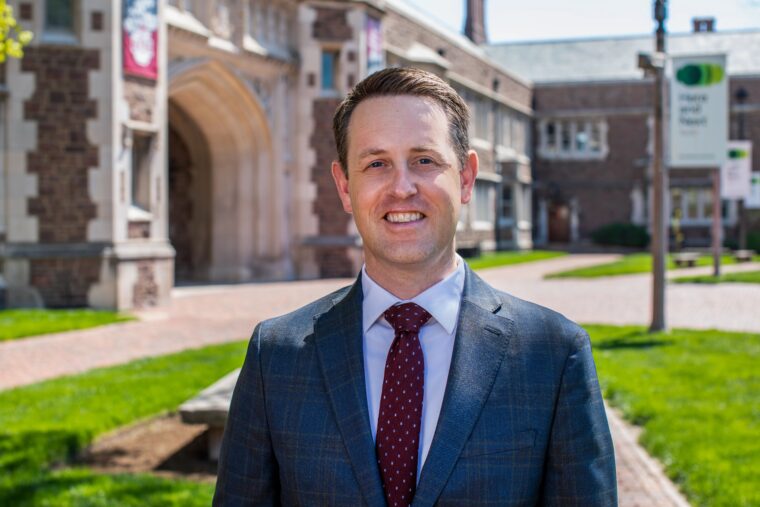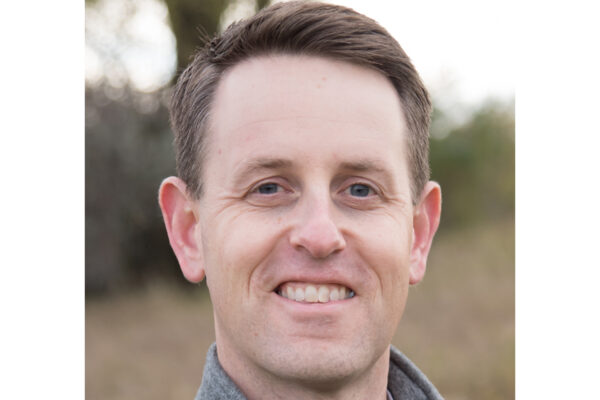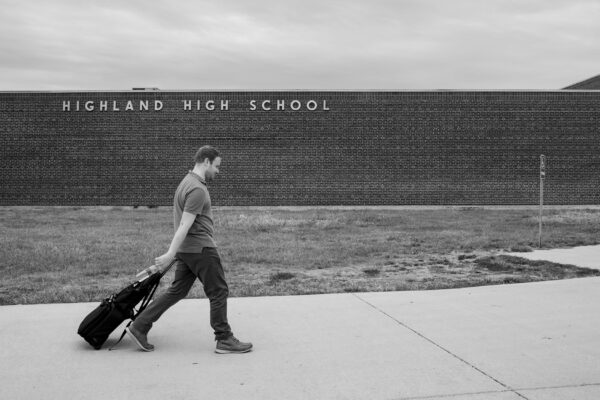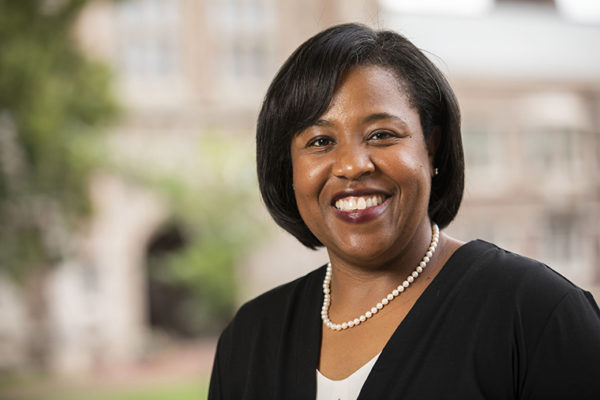Last March, J.D. Burton headed downriver from the University of Minnesota to St. Louis, where the Mississippi is a wee bit wider than it is in the Twin Cities. His destination: Washington University. His task: lead the team that represents WashU at all levels of government, whether federal, state or local.
“If there are issues that arise, or questions that elected officials have about work that’s underway here, it’s our job to help our external audiences understand our value,” says Burton, vice chancellor for government relations. Whether the issue involves the university and localized trash pickup, talking to state legislators about medical research, or advocating on how financial aid is provided to students across the country, Burton’s office is on it. Government relations also helps the broader community understand the value the university offers, he says, and how that affects the day-to-day work being performed here.
With almost one year in the books, Burton talks to Washington Magazine about his team; what it’s like to go from a public state university to a private institution; the unique challenges facing higher education in general and Washington University in particular; and how alumni can help.
How big is your team, and in what areas has it grown in the past year?
There are 10 of us, including myself, and it has grown since I arrived. One area of growth is related to our presence in Washington, D.C. For many years, we’ve had a wonderful staff member who did federal relations work but was based here on the Danforth Campus. We felt the need to open a space in Washington, D.C., in order to have a good portion of our federal work taking place where the decision-makers reside. And now we have two federal relations positions, one in D.C. and one on campus.
Another new position is an advocacy engagement coordinator. Some of the best information we can get to elected officials at all levels comes from people who have WashU connections, whether its alumni, donors, students, parents, community leaders, faculty or staff. We want to be able to empower those individuals to share stories about why WashU matters to them, and then have mechanisms and procedures in place so that they can directly carry that message to elected officials. If, for example, there are alumni across the state of Missouri who care about WashU, as constituents, their state legislator or Congressional representative or senator is more likely to respond to them. We’ve done a bit of that at WashU in the past, but not a great deal. We are going to institutionalize that approach and make that a key cornerstone of the work that we do.
How different is advocating for a private institution vs. a public one?
Probably the biggest difference is that we don’t have a big “ask” of the state to support our budget in the way that our friends in public universities do. What that means is that, since we weren’t at the state capitol every day making a pitch for resources, we didn’t have the chance to build the strong relationships that come with working through budget issues on a regular basis. What I’ve tried to instill in my team is that we should be thinking about ourselves in terms of that public-university-relationship-building effort. WashU provides a unique value to the state of Missouri, and there’s a really great story here. Even though we’re not asking the state for a lot of money to help us continue our work, it’s important that state legislators understand the work that’s going on here, and that we can be a valuable partner and a source of information. We now have a team member in Jefferson City full time who is strengthening our relationships and sharing the good work at WashU directly with members of the General Assembly.
How do politics come into play in your day-to-day work?
It’s our job, no matter if we’re residing in a Republican supermajority, a Democratic supermajority or somewhere in between, to bring forth the good work this place does and help people understand how WashU can make their lives better. So, depending on who is in charge and the audience you’re speaking to, you may have to raise different points or stress different areas of the work. In the end, whether you live in a blue state or red state, you still want to see your community, neighborhood and family’s life improve. We all want a healthy economy, good health care, good paying jobs, public safety, and an opportunity to grow and succeed. And higher education institutions, no matter what state you live in, offer that.
WashU is in a unique space in so many ways, particularly within health care, to offer exceptional value that you’re not going to find anywhere else in Missouri. We’re here for everyone. The enjoyable part of Government Relations is we get to be the ones that make that case to our governmental leaders.
What kind of stories best make that case?
Student stories are the most impactful. Stories that identify where students are from and how they got here gives us the chance to take those stories directly to the elected officials who represent them, and point out: “You’ve got a student coming to WashU free of charge, or who competed in this event, or who just became a Rhodes Scholar… ” Anything around student success, student access, affordability. The recent story about how WashU is paving a path for rural students is a fantastic example, because so many Missourians have the impression that this university is not available or affordable to them. For us to be able to carry these kinds of stories forward helps a great deal. Because we know that for every negative story, there are a hundred WashU stories that are really positive.
What would you like our alumni to know about government relations?
We have alumni in every state, and each one of them has an elected official. And their member of Congress is in a position to make decisions right now that will affect WashU. So it’s really important for our alumni around the country, no matter who represents them, to weigh in with their elected officials and say, “This issue is important to me, because it will affect my alma mater.” It’s our job to provide the tools and information needed so that alumni and others can understand what the issue is, and how it will affect WashU and what it will mean for them. And then they can go out and make the case for us. My calling a Congressman from Rhode Island or Colorado, for example, is not going to move them, nor should it. But local constituents calling them — who have read in the alumni magazine or somewhere else that Congress is, for example, looking at perhaps reducing federal financial aid for graduate students — can make a difference.
How do you advise people to engage elected officials?
It starts at the most personal level. Sending an email is easy, but these often don’t really break through unless they are somehow individualized or distinguishable from others. A handwritten letter is better than an email. Phone calls are valuable, too, as are meeting elected officials in the community, in their offices or at townhall meetings. If we have alumni, donors, or students who care about a particular issue, it’s our job to let them know when things are happening. We want our supporters to partner with us and engage their elected officials, and we’ll try to make that as easy as possible. We’re working on a formal program that will be announced in the coming months in which we hope to provide a lot more information through alumni networks on political engagement. We want to build an infrastructure program so effective that alumni — and staff, students and all community members who care about WashU — can engage with their elected officials on a regular basis and feel empowered to join our efforts to help WashU and our state and nation succeed.



